ContiTech To Focus On Industrial Segment In India
- By Gaurav Nandi
- February 22, 2025
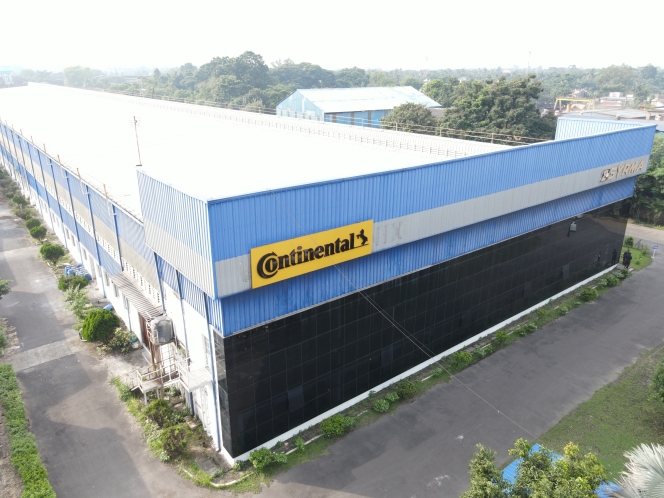
German automotive supplier Continental AG’s ContiTech arm will be focusing on its industrial segment in India, noted Chief Executive Officer of ContiTech Groupe, Phillip Nelles, during a visit to Kolkata.
Speaking to Motoring Trends exclusively, Nelles said, “ContiTech is doubling down on industrial applications, seizing opportunities amid India's multi-billion-dollar infrastructure and energy investments. With sweeping transformations underway, the company aims to cement its position as a leader in material-driven solutions. Our strategy is to focus on industrial sectors such as commercial vehicles, railways, construction and construction machinery, where we can deliver the highest impact.”
Picking up the sentiment, Hannes Friederichsen, Head of BA Industrial Solutions APAC, Continental AG, said, “We specialises in rubber, thermoplastic materials and rubber-metal bonded components, ensuring system-critical reliability for industrial clients. If a conveyor belt fails, it’s not just an inconvenience – it’s a system-critical disruption. That’s where we add real value.”
The parent company recently announced plans to spin off its automotive division and Contitech’s OESL. While industrial applications remain the core focus, the company acknowledges that the automotive sector operates on a different business model, requiring a distinct strategic approach.
In focus
ContiTech's core industries in India include mining, ports, energy, cement, highway vehicles, heavy trucks and construction machinery. Additionally, the company has a plant in Pune for its surface solutions vertical, producing foils and surfaces for vehicle interiors and living environments. Having already established a strong presence in Europe and the Americas, the company is now investing in APAC, with India playing a central role in its regional strategy.
The company operates a conveyor belt plant in Kalyani and another facility in Sonipat for power transmission belts and air springs. While specific investment figures were not disclosed, ContiTech plans to expand operations in both Sonipat and Kalyani, potentially diversifying the product portfolio in these locations.
“We’ve been laying the groundwork for major investments and are now scaling up with an expanded product portfolio and localised operations. In the commercial vehicle segment, we are focusing on air springs for trucks, trailers and buses, driven by increasing demand for comfort and tyre wear reduction. Additionally, we are exploring rubber-metal bonding systems for heavy-duty applications. The Pune facility remains a key part of this growth strategy, supporting increasing production volumes,” said Friederichsen.
The company is also eyeing opportunities in the motorcycle segment, particularly in seat coverings. As it expands, it plans to bring advanced technologies from its European and US operations into India, focusing on design, functionality and sustainability.
“Sustainability is a growing priority, and we have the expertise to integrate recycled materials into our products. We’re also enhancing functionality with features like embedded buttons and translucent surfaces for interactive displays while ensuring that vehicle interiors reflect modern design trends,” noted Nelles.
The company’s future innovations span beyond the cockpit, extending to seating, interior coverings and mid-arm components.
Another area of expansion is predictive maintenance services, aimed at identifying early warning signs for component replacement or repair. This initiative is expected to significantly reduce downtime and operational costs for industrial customers.
Additionally, ContiTech is actively involved in air springs for high-speed trains and metros. With India’s rapid rail infrastructure development, ContiTech is transferring its expertise to support high-speed and metro train projects.
Smart surface solutions
ContiTech is adapting its smart surface solutions portfolio for the Indian market. Commenting on the same, Friederichsen said, “Leveraging our material expertise, advanced design capabilities and expertise in living solutions, we're empowering our customers to design the car interior of the future. This includes the development of functional surfaces that bring the comfort and aesthetics of home interiors to future car interiors. Moreover, we're committed to sustainability, as evident from our first carbon-neutral product, XPRESHN - Carbon Neutral. We've also developed a comprehensive sustainability toolbox for our PVC products, catering to the diverse needs of our customers. Last year, we launched our Benova Eco Protect Line, a testament to our dedication to reducing environmental footprint.”
“In the commercial vehicle segment, our easy-to-clean surfaces, equipped with the staynu technology, are designed to enhance the well-being of truck drivers. By providing attractive cabin solutions, we are contributing to a better driving experience. In the Asia-Pacific region, we are observing a strong preference for translucent materials and super soft materials. We're well positioned to cater to these requirements, with a broad range of products that are generating significant interest among our customers,” he added.
Alluding to the significance of his visit to Kolkata, he noted, “We have been in the Indian market for many years and we are constantly scanning the market to identify opportunities to grow. Kalyani plant remains in focus for us to expand Indian operations, and as we follow the principle of ‘in the market, for the market’, we are evaluating opportunities of extending our local product portfolio too.”
Bharat Forge Subsidiary JS Auto Cast Secures INR 3 Billion From Premji Invest
- By MT Bureau
- February 02, 2026
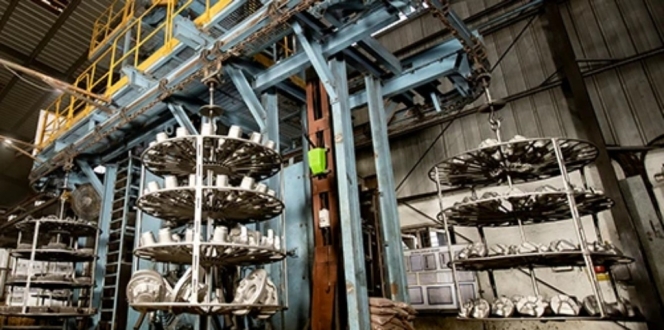
JS Auto Cast Foundry India (JSA), a subsidiary of Bharat Forge, has raised INR 3 billion crore in equity from Premji Invest (PI). Following the primary infusion of capital, Premji Invest will hold a 23 percent stake in the company on a fully diluted basis.
JSA is a supplier of ferrous castings for the industrial and automotive sectors. The company intends to use the capital to expand casting capacity, invest in medium casting capabilities, and pursue industry consolidation through acquisitions.
Since its acquisition by Bharat Forge in 2022, JSA has reported growth in revenue, exports, and profitability with a Compound Annual Growth Rate (CAGR) of 17 percent, 24 percent and 25 percent respectively.
Amit Kalyani, Vice Chairman & Joint Managing Director, Bharat Forge, said, “Since 2022 when we acquired JSA, the company has delivered excellent financial performance with topline, exports and profitability growing at a CAGR of 17 percent, 24 percent and 25 percent respectively, while enhancing its product mix and customer base. We are delighted to partner with Premji Invest (PI), a renowned and highly respected investor, in the next phase of JSA’s growth journey.”
The investment aligns with Premji Invest’s strategy of collaborating with engineering and manufacturing conglomerates on growth and consolidation initiatives.
Manoj Jaiswal, Partner, Premji Invest, said, “We are excited to partner with Bharat Forge, a premier engineering and manufacturing conglomerate in the country. Collaborating with leading conglomerates on their growth and consolidation journey is one of our strategic pillars. Through our investment in JSA, we look forward to jointly building a leading ferrous casting platform in the country.”
- Schaeffler India
- Symposium on International Automotive Technology
- SIAT 2026
- Deepak Kasturi
- Madhurisha VIppatoori
- Harsha Kadam
- Viswanathan Sambasivam
- Omkar Kulkarni
Schaeffler India Showcases Next-Gen Product Portfolio At SIAT 2026
- By MT Bureau
- January 28, 2026
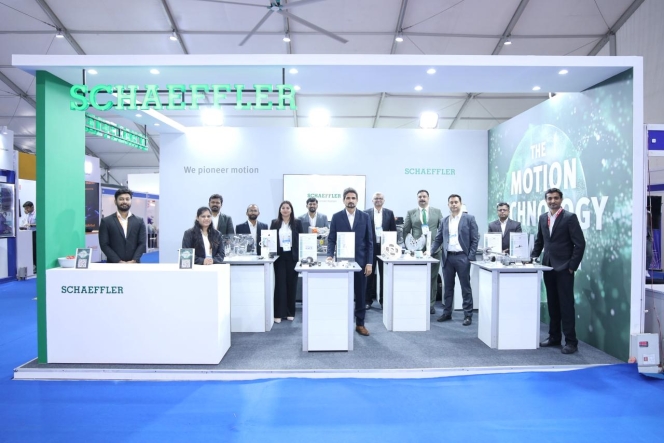
Tier 1 supplier Schaeffler India is showcasing a range of motion technologies at the Symposium on International Automotive Technology (SIAT) 2026. The company's exhibit at Hall Zone D includes electrification solutions such as drives, motors and modules, alongside powertrain systems for internal combustion engines and hybrid vehicles.
The portfolio on display features chassis components, sensors, fuel delivery modules, and bearings designed to reduce friction in vehicles. The company is highlighting its local engineering capabilities and its work with manufacturers to develop mobility solutions within India.
Company executives are participating in the symposium's technical programme. Madhurisha Vippatoori, Chief Technical Officer, is chairing the Testing and Evaluation track. Deepak Kasturi, Head of Innovation India, is delivering a keynote address regarding Euro 7 standards and real-time emissions monitoring.
The company stated that its presence at the event reflects its focus on engineering innovation, energy efficiency and collaborative development with automotive customers and academia.
Harsha Kadam, CEO & MD, Schaeffler India, said, “As a leading mobility solutions provider in India, we at Schaeffler are proud to be associated with all the leading automotive customers in shaping the future of mobility. We are equally committed to supporting our customers across various types of powertrains that will support cleaner, electrified, and intelligent mobility. Together, we are shaping a more secure, sustainable, and future-ready India.”
Viswanathan Sambasivam, Division Head - Powertrain & Chassis India, said, “SIAT provides an ideal platform to demonstrate how we are shaping mobility for India. Our focus is on co-engineering with OEMs, accelerating technology transfer, and strengthening local value creation. The solutions we are bringing this year represent the next step in advancing clean, safe, and smarter mobility.”
Omkar Kulkarni, Division Head - E-Mobility India, said, “India is one of our most important engineering hubs. Our teams here are working closely with customers to design for India, build in India, and innovate for India. The technologies displayed at SIAT underline our ability to combine global expertise with local development capabilities.”
Indian Auto Component Industry Set To Showcase Its Prowess At ACMA Automechanika New Delhi 2026
- By MT Bureau
- January 28, 2026
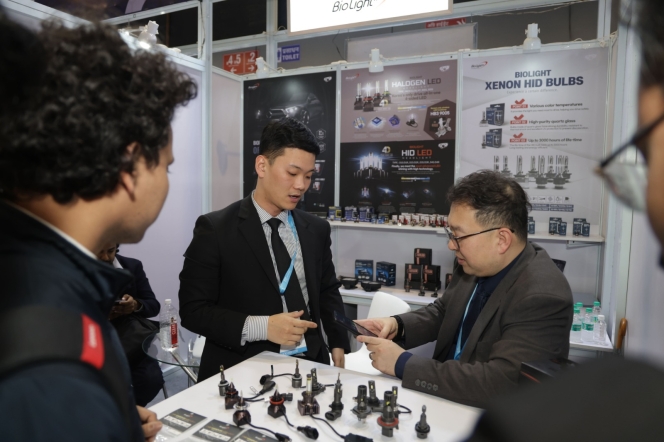
The Indian automotive component industry was valued at USD 80.2 billion in FY2025, with the aftermarket segment contributing USD 11.8 billion. Data from the Automotive Component Manufacturers Association of India (ACMA) indicates the sector grew by 6.8 percent to reach USD 41.2 billion in the first half of FY2026. Industry projections suggest the component market will reach between USD 111 billion and USD 200 billion by 2030.
Against this growth, the ACMA Automechanika New Delhi 2026 trade fair will take place from 5 to 7 February 2026 at Yashobhoomi, New Delhi. Organised by Messe Frankfurt Trade Fairs India and ACMA, the event will host more than 870 exhibitors. The fair serves as a platform for manufacturers, distributors and service providers to showcase innovations in spare parts, electronics, diagnostics and workshop equipment.
The exhibition will feature participation from 20 countries, including Germany, Japan, Korea and the USA. Dedicated pavilions will highlight technologies from nations such as China, Italy and Taiwan. The event focuses on electrification, alternative fuels and digital authentication. Exhibitors will display ethanol-ready components, hydrogen systems and electric vehicle charging solutions.
Raj Manek, Executive Director and Board Member of Messe Frankfurt Asia Holdings, said, “As India prioritises quality-led development across sectors, ACMA Automechanika New Delhi 2026 will showcase how the auto components and aftermarket industry is advancing in sync with global trends. The show will unite visitors and exhibitors in a massive international gathering, converging cutting-edge innovations, sustainable component solutions and clean-fuel ecosystems. Global participants are increasingly drawn to India's pivotal role in this transition, with organisations showing strong enthusiasm for tech-driven solutions to combat climate change and build a thriving and a cleaner future”.
Vinnie Mehta, Director General of ACMA, added, "India’s automotive aftermarket is moving towards a more structured, quality-driven and globally aligned future. The auto component industry grew by 6.8 percent to USD 41.2 billion in the first half of FY26, supported by stable domestic demand, a resilient aftermarket and sustained investments in capacity expansion, localisation and technology upgradation. ACMA Automechanika New Delhi provides an important platform for industry stakeholders to engage with emerging technologies, regulatory developments and global market opportunities”.
Sona Comstar Reports 39% Revenue Growth In Q3 FY2026
- By MT Bureau
- January 23, 2026
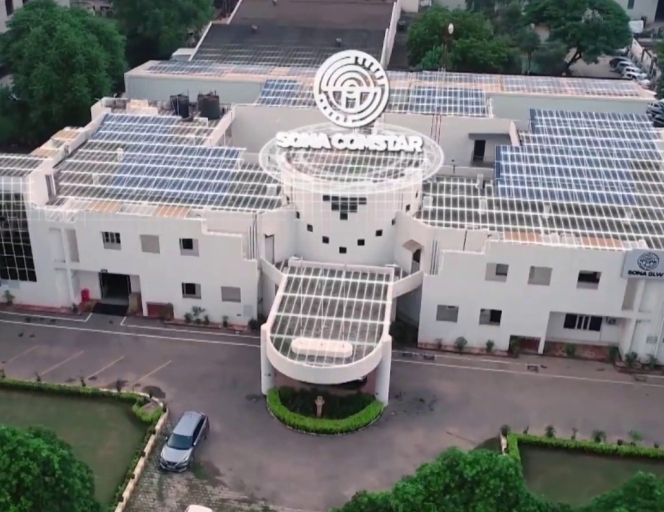
Sona BLW Precision Forgings (Sona Comstar) has announced its financial results for Q3 FY2026, reported revenue of INR 12.09 billion, a 39 percent increase YoY.
The company’s EBITDA grew by 25 percent to INR 3.2 billion with a margin of 25.2 percent, while net profit rose by 20 percent to INR 1.8 billion. Revenue from Battery Electric Vehicles (BEV) represented 38 percent of total turnover.
In the first 9-months of FY2026, the company secured six new programmes, bringing the total to 65 across 33 different customers. Additionally, Sona Comstar was awarded a programme from a new customer to supply hydraulic motor controller.
Vivek Vikram Singh, MD & Group CEO, Sona Comstar, said, “We achieved our highest-ever quarterly revenue, EBITDA, and adjusted net profit in Q3 FY2026. Our revenue grew strongly by 39 percent YoY, primarily driven by the expansion of our electric vehicle traction motor and railway business in India. BEV revenue share improved meaningfully to 38 percent in Q3 from 32 percent in Q2FY2026 and represents our second-best quarter till date in terms of absolute BEV revenue and share. We have commercialised a new product in this quarter, the hydraulic motor controller, leveraging our strengths in motors and controllers to develop the solution for a new application outside the current product portfolio. We continue to add new EV customers and win new EV programs from our existing EV customers. Moreover, we commenced sample production of in-cabin radar sensors in our new SMT line at Chennai facility in this quarter, making us one of the few automotive radar manufacturers in India with local SMT manufacturing capability.”







Comments (0)
ADD COMMENT